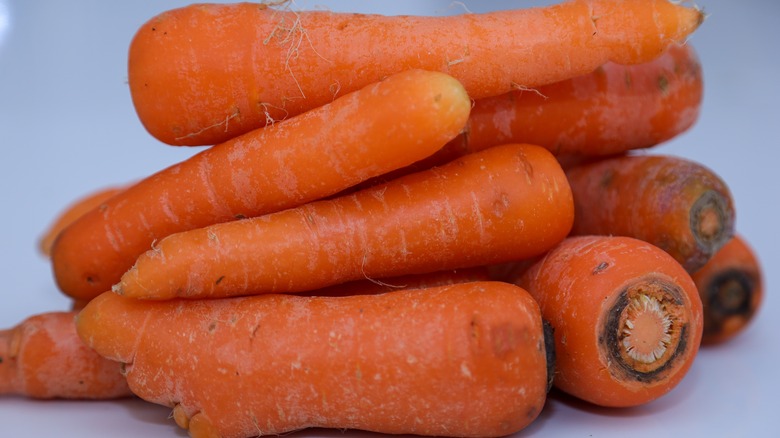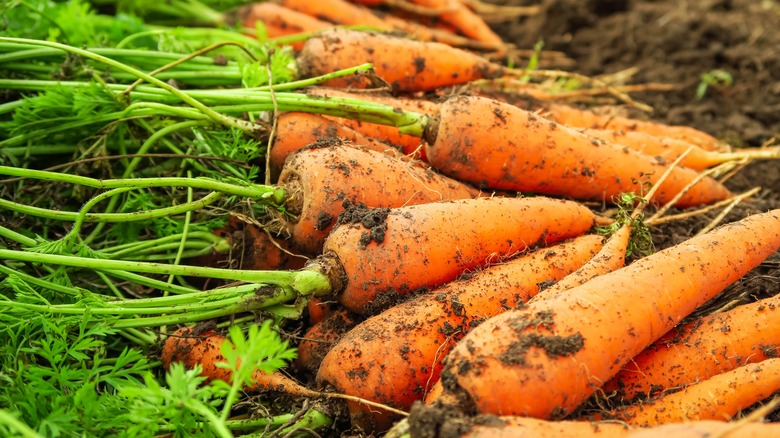The Science Behind Why Your Carrots Taste So Soapy
Ever wondered why some carrots taste like soap? If you've encountered this odd and unpleasant phenomenon — maybe while trying to enjoy some fresh-cut carrots with hummus or otherwise — it might have left you wondering if your carrot wasn't rinsed properly, or worse, some pesticide or other harmful chemical has made its way into the carrot itself. The good news is that the soapy bitterness is caused by naturally occurring compounds in the carrot. Like many other fruits and vegetables, carrots contain a variety of compounds known as terpenes and terpenoids.
While they might sound somewhat alarming to have in your food, terpenes and terpenoids are widespread in nature and not at all poisonous. They play essential roles in biological processes, serving as defense mechanisms for plants against herbivores and pathogens, attracting pollinators, and more. These compounds actually contribute to the sweet and earthy aroma of the carrot as well — the soapy bitterness is caused when there's a buildup of too many terpenes and terpenoids that taste bitter and noxious in high concentrations, overpowering any actual sweetness in the carrot.
While it might be difficult to pinpoint what caused your carrot to have the soapy taste problem, certain factors like carrot variety and growing conditions can play a part in how terpenes and terpenoids are produced. Unfortunately, there's not very much you can do for a soapy carrot other than cooking it and hoping most of the harsh taste goes away.
What are terpenes?
It's not surprising that terpenes and terpenoids might be responsible for a strong, soapy taste in carrots if you consider the fact that they're the usual culprits behind many other famously powerful aromas in fruits and vegetables. A common terpene you're probably well-accustomed to smelling is d-limonene, the compound present in citrus peels that is responsible for that signature zesty tang as well as its effectiveness in cleaning solutions. Additionally, many terpenes are directly used in the production of synthetic fragrances in perfume.
Knowing that it's probably not hard to imagine that too much terpene might result in bitter soapiness. The list of terpenes directly identified as the culprits behind the bitterness in certain carrots include beta-myrcene, a common intermediary used in synthetic essential oils, as well as synthetic fragrances in household products. While it's difficult to prove outright, its distinctly resinous and green smell — as well as its bitterness when gathered in high concentrations — makes it a likely contributor to any soapy smells or tastes in carrots.
One proven cause for high levels of terpene and terpenoids in carrots is the general growing temperature. Studies show that, while carrots grown in higher temperatures have the highest sugar content, they're consistently more bitter than carrots grown in colder conditions due to higher terpene concentration. Other possible causes, like exposure to other fruits or early harvesting, have been suggested, but there is little research to conclude why or how these factors might cause higher concentrations of terpenes.
So, what do you do with soapy carrots?
Unfortunately, this means that there's not a lot you can do to identify and avoid buying soapy carrots unless you personally know the details of how the carrots were grown. However, that doesn't necessarily mean you should throw out soapy carrots. As previously mentioned, the soapiness isn't poisonous at all — in fact, many naturally-occurring terpenes and terpenoids like beta-carotene have been identified as antioxidants that are quite good for your health, according to Healthline.
While it's hard to get rid of the soapy taste in carrots altogether, there are ways to mitigate it. You could cook the carrots into a soup or other savory dish to break down some of the terpenes and mask them with other flavors. Alternatively, you can also freeze and thaw the carrots. The breaking of cells in the freezing and thawing process causes the terpenes to leak, making the carrot sweeter — however, this same breakdown will probably have some negative impact on the texture.
It's also worth noting that the soapiness of a carrot seems to be somewhat subjective from one person to another, and some individuals taste it more keenly than others. If you often find that carrots taste soapy to you, you might be more sensitive to certain terpenes and terpenoids in carrots — the best thing you can do is to try different carrot varieties or brands to find a consistently non-soapy source of carrots.


